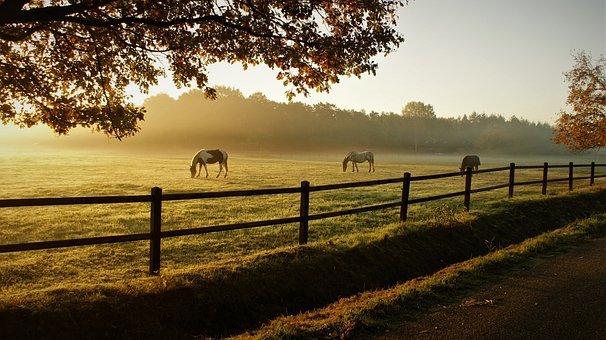Tuesdays with Tony
It’s February. For other parts of the country that means snowstorms, bitter cold, and all the finest winter has to offer. For Florida, it means some cold days, and some 75 degree days, and maybe some really cold days. I hate really cold days. It detracts from my strict property assessment schedule, and leaves me uncomfortable even while sunning in the middle of the driveway watching the humans drive around me. That’s right, don’t expect me to move. I know, get to the point. Here in Florida, February is the ideal time to get started on growing grass. I have listened to more than my fair share of Pasture Management Seminars. Between that and being a cat, I’m an expert.
What kind of soil do you have?
This is the biggest reason you should start thinking about your grass now. Soil testing will tell you what you need to do to make your ground a place grass wants to grow. Even though Florida is strong on sunshine and water, it’s often really weak on other things plants need to grow like nitrogen, and a neutral soil pH. Much like everything in life, there’s the right way to soil test, and all the other ways. The best way is to start by evaluating your property. If you’ve got a whole lot of acres, the chances are you have a few different soil types.
Test similar soils together, and estimate how much property you have of each type so you will know how much fertilizer of each kind you’ll need. To do that soil test, you could grab a handful of soil and call it a day. This would be the wrong way to soil test. Instead, take a shovel and a wheelbarrow and start wandering your property. Every 50-100 feet or so take the vegetation away to expose the soil underneath, and put about half a shovelful in your wheelbarrow. Carry on until you’ve sampled your whole place. Now mix thoroughly. Then mix again just to be safe. Next, take a few handfuls of that soil, spread them out on newspaper and let them dry. Once dry, use the envelope you got from the soil testing lab that your fertilizer company or local County Extension Agent told you about, and send your soil off for testing.
County Extension
Middle of the blog aside here: Call your County Extension Office!!!! These people know all kinds of useful things, and your tax dollars pay for them, so use them! From how to grow grass, to managing pests, to gardening, to managing home finances, seriously knowledgeable people. Call them. And now back to our regularly scheduled blog.
Fertilizing
Now you know what to get for your fields. It will be important to talk with your fertilizer company about the best time for actually fertilizing. Here in Florida, it’s generally before the rains start in June. Now that’s tricky timing, isn’t it? Put fertilizer out, but not too soon since it will just burn up, but not too late or it will all wash away into our poor overtaxed aquifer in one torrential rain and then the springs and your pasture will both be in trouble. Anyway, watch the weather and talk with the fertilizer companies about timing. Or look into cover crop options that may work to help get nutrients into the soil without using chemical fertilizers.
The hardest part about cover crops is that they cover stuff. I’m not being a smart alec. Okay, I am, but really it’s that these crops generally cover the soil underneath while they’re doing their thing. This means grass isn’t growing, and horses may not be enthralled with eating the cover crop instead. Consider cover crops if you’ve got an area you aren’t using for a while.
Grass
Finally, grass. The thing we’ve all been waiting for. Talk to your County Extension Agent and your fertilizer supplier about when and how to best plant grass. There are different options depending on a number of different factors including how many horses you’ll have per acre, if this is a new pasture, or if you’re looking to help an older pasture get back to happy. There are some really great grass seed options that have all kinds of great things for Florida including drought resistance, and longer growing seasons. While you’re talking grass, you can talk about rye grass as a winter add-on.
Keep that grass happy!
Now that you’ve got grass, keep your grass. Horses are hard on their pastures! Horses are just plain hard on everything, if I’m being an honest cat. Designing your pasture to allow rotation in 2-4 week intervals will allow your pastures a break from all those thundering hooves and ripping teeth. Bonus: this is also good for breaking parasite life cycles. This can be as complex as multiple fenced pasture areas, or as simple as a hot wire that divides your pasture. If you go the hot wire route, I recommend tape. It’s easier for the horses to see, and make sure it’s HOT. Horses do tend to respect electricity! Giving grass as little as two weeks to recover will keep it growing better and longer.
Now you know all you need to be the envy of the neighborhood. However, if you want more, we’ve got pasture management seminars on our YouTube channel, and you can always call your County Extension agent if you didn’t catch it the first two times I told you. Grass can be a tricky bugger, unless it’s a sidewalk where you absolutely do not want grass to grow. Doing a little work can go a long way to ensuring your spoiled horse has all of it they desire. More grass also means less hay, which means lower feed bill, for an added bonus.
Until next week,
~Tony
P.S. Can’t get enough of me? I’ve got years of blogs at SpringhillEquine.com on any topic you can imagine. Had enough of me? Check out the podcast by my humans called Straight From the Horse Doctor’s Mouth anywhere you get podcasts. It’s got somewhere around 70 episodes of awesome free veterinary knowledge for your listening pleasure.
Tuesdays with Tony is the official blog of Tony the Clinic Cat at Springhill Equine Veterinary Clinic in Newberry, Florida. If you liked this blog, please subscribe below, and share it with your friends on social media! For more information, please call us at (352) 472-1620, visit our website at SpringhillEquine.com, or follow us on Facebook!
[jetpack_subscription_form title="Subscribe to Whinny's Wisdoms"]


